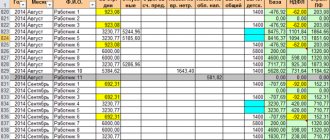Limitations on the amount of deductions from wages are specified in Article 138 of the Labor Code of the Russian Federation.
When a person enters into a working relationship with a company, he takes on a number of obligations to perform work of one kind or another. In turn, the manager undertakes to pay the person for his work in the manner and amount specified in the work agreement.
Sometimes circumstances may arise in which the interests of the organization or other people may be subject to material or moral damage. In such cases, the perpetrator will be obliged to compensate for the damage caused.
A person can solve a problem in different ways. For example, if the organization’s property is lost, the culprit can replace it with an equivalent one. But in most cases, compensation is monetary in nature.
Art. 138 Labor Code of the Russian Federation: questions and answers
Art. 138 of the Labor Code of the Russian Federation duplicates the requirements of other laws regarding restrictions on the collection of funds from the debtor to pay off debts from his salary. It should be borne in mind that we are talking about debts confirmed by the court, in respect of which a decision was made to collect from the debtor’s salary.
Contents of Article 138 of the Labor Code of the Russian Federation
On what grounds can up to 50% of salary be seized?
On what grounds is it possible to withhold up to 70% of salary?
What payments from an employer cannot be deducted for debts?
How is the amount based on which deductions are calculated?
What is the procedure for deducting debts from wages?
What nuances are there regarding alimony?
Performance list
A writ of execution is a document issued by authorized bodies or a court confirming the employer’s right to withhold part of the funds from a person’s salary. This is regulated by the Family Code of the Russian Federation and Federal Law No. 229. A request to recover funds can come not only from the employee himself, but also from the court.
At the employee’s initiative, a writ of execution is issued:
- If periodic payments are required;
- When requesting funds, the amount of which does not exceed 25 thousand rubles.
- At the initiative of the courts, this document is issued:
- If necessary, an amount not exceeding 10 thousand rubles;
- If permanent payments are necessary, such as alimony;
- In a situation where the employee does not have the means to bear the obligations under the writ of execution.
If these conditions are met, the employer recovers the necessary funds from the employee's pay.
After receiving the writ of execution, it must be presented at the place of work with the relevant documents. It is necessary to attach the details of the account to which the funds will be sent, a copy of the document and a decree from the bailiff, if any.
In case of loss of the writ of execution, the person must bear liability in the form of a fine in the amount of 50,000 to 100,000 rubles. Therefore, it is necessary to approach this issue responsibly and appoint responsible people for obtaining these documents.
On what grounds can up to 50% of salary be seized?
In accordance with the Law “On Enforcement Proceedings” dated October 2, 2007 No. 229-FZ, up to 50% of the salary can be withdrawn on the basis of:
- court writs of execution;
Attention! From June 9, a copy of the writ of execution is a valid basis for deductions from wages.
- court orders;
- resolutions on administrative offenses;
- notarial agreements on the payment of alimony;
- orders of bailiffs.
At the same time, if there are several executive documents, it is not allowed to withdraw more than 50% of earnings for payments (Article 99 of Law No. 229-FZ).
Article 138 of the Labor Code of the Russian Federation. Limitation on the amount of deductions from wages (current version)
1. This article provides general and special rules regarding limiting the amount of deductions from an employee’s salary. It has a guarantee nature, ensuring payment to the employee of a certain amount of wages sufficient to satisfy his basic living needs.
2. As a general rule, all deductions from wages cannot exceed 20% of accrued wages. This limitation applies in cases of deductions provided for in Art. 137 TK. For deductions made by decision of government bodies or by virtue of direct instructions of the law, it is applied unless other rules are established.
3. Along with the general art. 138 provides special rules. These include deductions made on the basis of enforcement documents (writs of execution issued by the courts; court orders; decisions of bodies (officials) authorized to consider cases of administrative offenses; notarized agreements on the payment of alimony; decisions of the bailiff).
The rules for foreclosure on wages are provided for in Art. Art. 98, 99, 101 of the Law on Enforcement Proceedings. In particular, when foreclosure on wages, more than 50% of wages cannot be withheld from the debtor for each payment. In this case, the amount of deductions from wages is calculated from the amount remaining after taxes are withheld (Article 99 of the Law).
These restrictions do not apply: when collecting alimony for minor children; compensation for harm caused to health; compensation for damage to persons who suffered damage as a result of the death of the breadwinner, and compensation for damage caused by a crime. In the listed cases, the amount of deductions from wages cannot exceed 70% (Article 99 of the Law).
Limitations on the amount of deduction from wages do not apply when foreclosure is applied to funds held in the debtor’s accounts to which the employer credits wages, with the exception of the amount of the last periodic payment (Part 3 of Article 99 of the Law on Enforcement Proceedings).
4. The amount of deductions from the earnings of a person sentenced to correctional labor is established by Art. 50 of the Criminal Code of the Russian Federation, and the procedure for making deductions is Art. 44 Penal Code of the Russian Federation.
5. The amount of alimony withholding for the maintenance of minor children, spouses and other relatives is determined by the RF IC (Articles 80 - 82, 100, 103, 110, 111, 113).
6. Deductions from compensation payments established by labor legislation are not allowed, namely payments:
a) in connection with a business trip, transfer, employment or assignment to work in another location;
b) due to wear and tear of a tool belonging to the employee;
c) in connection with the birth of a child, the death of relatives, and the registration of marriage.
Collection cannot be applied to the amount of full or partial compensation for the cost of vouchers, with the exception of tourist ones, paid by employers to their employees and (or) members of their families, disabled people who do not work in this organization, to sanatorium-resort and health-improving institutions located on the territory of the Russian Federation , as well as for the amount of full or partial compensation for the cost of vouchers for children under the age of 16 to sanatorium-resort and health-improving institutions located on the territory of the Russian Federation (Article 101 of the Law on Enforcement Proceedings).
On what grounds is it possible to withhold up to 70% of salary?
Withhold up to 70% of the salary, according to Art. 99 of the Law “On Enforcement Proceedings” dated October 2, 2007 No. 229-FZ, it is possible in the following cases:
- withholding of child support for minor children;
- compensation for personal injury;
- compensation in connection with the loss (death) of a breadwinner;
- compensation for damage resulting from a crime.
According to the norms of the Family Code of the Russian Federation dated December 29, 1995 No. 223-FZ:
- under a notarized agreement on the payment of alimony (Article 110 of the RF IC).
According to the norms of the Labor Code of the Russian Federation:
- when the debtor is serving a sentence (executive work) ( Article 138 of the Labor Code of the Russian Federation).
Commentary to Art. 138 Labor Code of the Russian Federation
1. This article establishes the maximum amount of deductions from wages, limiting it to a certain proportion of paid earnings. These restrictions are intended to ensure the protection of wages, which are the main or even the only source of livelihood not only for the employee, but often for his family members, and thereby guarantee that wages fulfill their socio-economic function.
2. As a general rule, for each payment of wages, no more than 20% of the total amount for all types of deductions can be withheld. This withholding limitation applies in all cases unless otherwise provided by federal law.
Employer-mandated withholdings may under no circumstances exceed 20%.
3. The amount of deductions should not exceed 50% of wages in cases where deductions are made on the basis of an executive document. Executive documents mean the documents specified in Art. 12 of the Federal Law of October 2, 2007 N 229-FZ “On Enforcement Proceedings”: writs of execution issued by the courts; court orders; notarized agreements on the payment of alimony or their notarized copies; certificates issued by the CTS; acts of bodies exercising control functions on the collection of funds; judicial acts, acts of other bodies and officials in cases of administrative offenses; orders of the bailiff; acts of other bodies in cases provided for by federal law; writ of execution by a notary if there is an agreement on an extrajudicial procedure for foreclosure of the pledged property, concluded as a separate agreement or included in the pledge agreement.
4. Part 2 of the commented article introduces an additional restriction: if deductions are made on the basis of several executive documents, the total amount of deductions cannot exceed 50% of the employee’s earnings.
5. The amount of deductions should not exceed 70% of wages in cases where deductions are made when:
a) serving correctional labor on the basis of a court verdict;
b) collection of alimony for minor children;
c) compensation for harm caused to the health of another person;
d) compensation for damage to persons who suffered damage in connection with the death of the breadwinner;
e) compensation for damage caused by the crime.
6. In accordance with Art. 50 of the Criminal Code of the Russian Federation, when imposing a punishment in the form of correctional labor, deductions are made from the earnings of the convicted person in the amount of 5 to 20%. If, along with this, deductions are made for other reasons, then the total amount of deductions cannot exceed 70% of earnings.
7. In accordance with Art. Art. 80 and 81 of the Family Code of the Russian Federation (hereinafter - FC), if parents do not provide maintenance for their minor children, funds for the maintenance of children (alimony) are collected in court, and the amount of alimony is determined either by the share of earnings (1/4 for one child, 1 /3 - for two and 1/2 - for three or more, and this amount can be increased and decreased by the court taking into account the financial situation of the debtor, the children for whose maintenance alimony is being sought, and his other minor children), or in the absence of the debtor regular income in a fixed amount. Furthermore, in accordance with Art. Art. 100 and 103 of the SK, it is possible to conclude a notarized agreement on the payment of alimony, which must establish the amount of alimony for minor children no less than that provided for in Art.
What payments from an employer cannot be deducted for debts?
It is impossible to make deductions from most funds if the debtor himself receives them as legal compensation (Article 101 of Law No. 299-FZ). Such payments include:
- payments for health damage;
- payments in connection with the death of the breadwinner;
- payments received in connection with injury, as well as in connection with the death of a family member;
- payments from budgets of various levels to victims of man-made disasters, natural disasters and similar emergency situations;
- compensation for travel, expenses in connection with business trips and relocations for official reasons, purchase of labor tools (tools) at your own expense;
For more information about compensable expenses for business trips, see the material “How can I confirm expenses for renting an apartment for employees on a business trip?” .
- alimony received;
- benefits for childbirth, death, marriage;
- payment by the employer of the cost of vouchers to sanatorium-resort and health-improving institutions in Russia for an employee and his family members under 16 years of age;
- payment by the employer of the cost of travel to the place of treatment and back in cases provided for by law.
Second commentary to Article 138 of the Labor Code
1. Guarantees for the protection of wages from unjustified deductions include not only an exhaustive list of cases when the Code allows deductions from wages, but also limiting the amount of deductions to a certain limit. As a general rule, the amount of all deductions for each payment of wages cannot exceed 20% of the wages due to the employee.
2. In cases directly specified in federal law, the amount of deductions cannot exceed 50% of wages. Article 66 of the Federal Law “On Enforcement Proceedings” of July 27, 1997 (SZ RF. 1997. N 30. Art. 3591) provides that when executing a writ of execution, no more than 50% of wages and equivalents may be withheld from the debtor payments and payments until the amount collected is fully repaid. If deductions are made simultaneously from an employee’s salary according to several executive documents, then 50% of his earnings must be retained.
3. The restrictions provided for above do not apply in the following cases: when collecting alimony for minor children; for compensation for damage caused to health and compensation for damage to persons who suffered damage as a result of the death of the breadwinner; when compensating for damage caused by a crime. In these cases, the amount of deductions from wages cannot exceed 70%.
4. Article 68 of the Federal Law “On Enforcement Proceedings” provides that social insurance benefits (for temporary disability, pregnancy and childbirth, child care during partially paid leave, etc.) can be recovered only by court decision or court order on the collection of alimony or a notarized agreement on the payment of alimony or by a court decision on compensation for damage caused to health and compensation for damage to persons who suffered damage as a result of the death of the breadwinner.
5. Among the payments that cannot be levied, Art. 69 of the above Law refers to amounts of money paid:
1) for compensation for harm caused to health, as well as compensation for harm to persons who suffered damage as a result of the death of the breadwinner;
2) persons who received injuries (wounds, injuries, concussions) during the performance of their official duties, and members of their families in the event of death of these persons;
3) in connection with the birth of a child; mothers of many children; single father or mother; for the maintenance of minor children during the search for their parents; pensioners and disabled people of group I to care for them; victims for sanatorium treatment, prosthetics and costs of caring for them in the event of harm to health; for alimony obligations;
4) for working under hazardous working conditions or in extreme situations, as well as for citizens exposed to radiation as a result of disasters or accidents at nuclear power plants, and in other cases established by the legislation of the Russian Federation;
5) by an organization in connection with the birth of a child, the death of relatives, the registration of a marriage, as well as severance pay paid upon dismissal of an employee.
What is the procedure for deducting debts from wages?
After deducting taxes from the debtor’s salary, the employer makes the remaining deductions, taking into account the maximum limit, in the following order:
- in the 1st place: alimony; compensation for damage to health, for the death of a breadwinner, for damage in connection with a crime;
- in the 2nd place - other deductions (including in your own favor).
If the amount of the amount does not allow satisfying all the claims in the queue at once, then partial repayment for each claim is possible, distributed in proportion to the amounts specified in the executive documents (Article 111 of Law No. 229-FZ).
In this case, the remaining balances of debts for the month are carried over to the following periods and are summed up with payments due for these subsequent periods until all debts are repaid in full.
Voluntary deductions
Every citizen has the right to demand from his boss to withhold any part of his income to pay off mandatory payments. In this case, the employee himself can set the percentage that will be deducted from his salary. The grounds for drawing up an application may be as follows:
- To repay loans and borrowings.
- Payment for insurance.
- Contributions to trade unions and other associations.
- Transfer of funds to charity.
The citizen must write an application addressed to the employer indicating the purpose for spending this amount. You can write in any form, or you can contact the accounting department to provide the appropriate form. With this document, he agrees to transfer funds from his salary to the authority that he indicated.
It is not the employer's responsibility to accept such applications, so they can safely reject it. Also, a citizen must take into account the commission when calculating the amount and pay it independently. This should also be indicated in the document.
What nuances are there regarding alimony?
When establishing alimony in a fixed amount, it must be indexed in accordance with the increase in the cost of living for the corresponding category of citizens in the region or in Russia (if the level of the cost of living has not been established for the region). On such indexation, a decree must be issued by the bailiff and a corresponding order from the one who makes the deductions (Article 102 of Law No. 229-FZ).
IMPORTANT! In terms of child support, deductions can also be made from temporary disability benefits, if there is a court decision or court order (subsection “c” of Article 82 of the RF IC, clause 2 of the RF Government Resolution No. 841 of July 18, 1996).
When transferring alimony, you must also take into account that the costs of the transfer must be paid by the debtor, and not by the organization transferring the alimony (Clause 3, Article 98 of Law No. 229-FZ).
You can find more complete information on the topic in ConsultantPlus. Full and free access to the system for 2 days.







